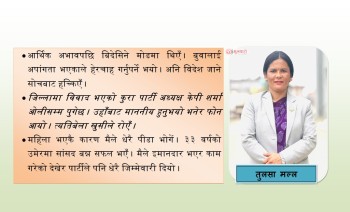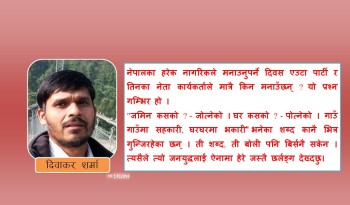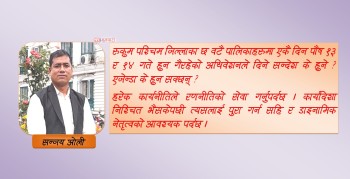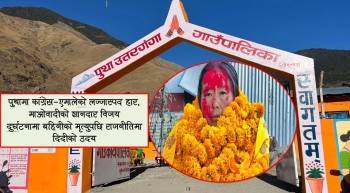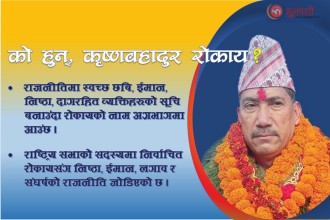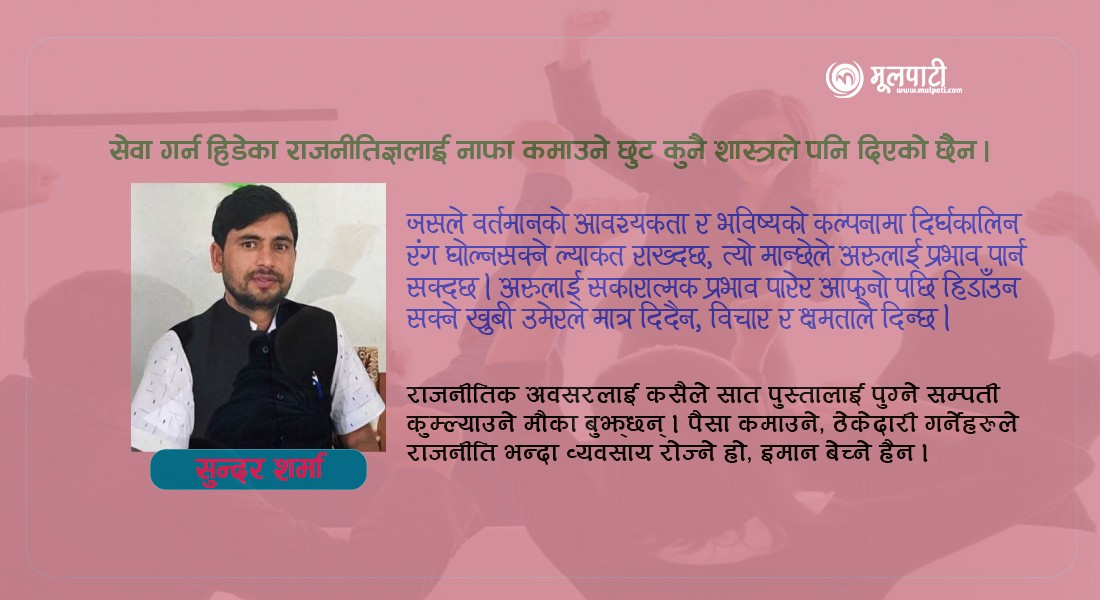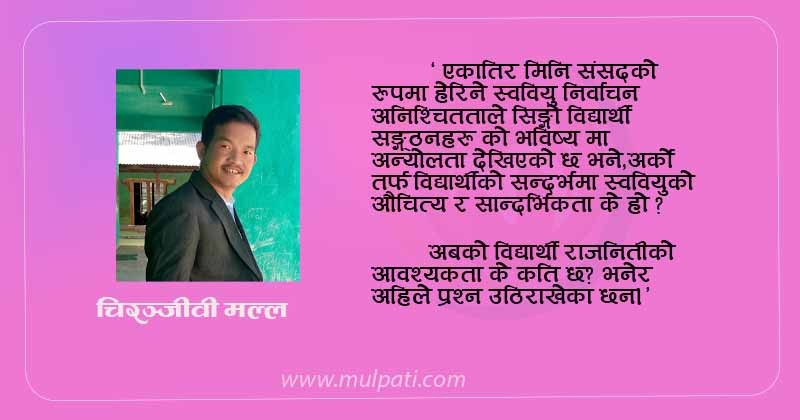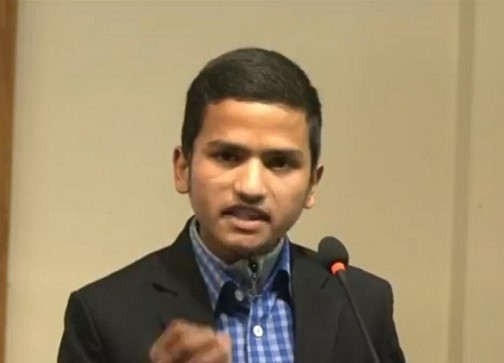- Bharat Khatri
Politics is the major responsible subject to determine the political, economic, social, cultural works, respectively. The present political culture of Nepal is narrow to address the whole features of democratic country. Its natures are directly connected with irregularities and against the prime concern of democracy, constitutionalism. This article in detail explores how and why current political culture has ignored sustainable development and prosperity etc. And also its negative impacts upon the political system as directly joined with sovereignty, independence, territorial integrity.
Politics has an extensive approach in which it regulates the whole structure and creates the political environment whereas culture is connected with practices. Accepting personal interest and rejecting the national heavy interest is a common feature of the Nepali political culture. They promote nepotism, corruption, irregularities, instability and harmful conflict. Current political culture is only focusing on certain politician interests. Politicians of developed countries use their available resources to develop and show they are ready to fight for prosperity. And people's representatives are going in that way as created by the country on the basis of national political, economic, social, cultural interests. The working nature of the government is directly joined with people’s intention and need.
Development and Prosperity
For development and prosperity, there must be subjective political power that can govern the system freely. Political struggle leads to how the country develops. Because development is based upon political culture. The combination between political culture and development, prosperity is necessary to express change. Therefore, political stability is a must for political, social and economic development and system improvement. Cultural transformation with democratic value is a key thing now due to the fundamental feature of democracy that helps people and rulers to increase their effective participation everywhere properly. Thus, consolidation of democracy has success only after a change in political culture and absence of anti-democratic actors as well as movements in the country. In democracy, the political party behavior must be changed accordingly for democracy to develop. Our country has been facing unmatched politics with national goals. Political practices of Nepal are not real politics therefore it does not help the country. Our politicians have been busy going against each other unfairly. Showing blame to each other is not able to develop, therefore, accepting and applying democratic approaches with a combination of political parties only help to obtain our national and international goals.
Effective Implementation of the Provisions
In today’s Nepal, there are several political parties and people also divided into these parties where they have been guided by their own political ideology. They create conflict in the country when their agenda has not been freely accepted by other parties and their interest is contradictory. They are not only ideologically but they have divided in behavior too. Also the cooperation has missed among them. Then national goals have been orphaned due to their personal interests and behaviour. Therefore, we have to create good cooperation to achieve the national goals like implementation of the provisions. We have to work together to implement the constitution. The unfair struggle between political parties is the key obstacle of our country. It does not meet the national goals but obviously it will meet their personal interests. However, the political parties have forgotten that thing. Political instability and politicians' behavior have made the house of parliament unstable in Nepal. Where parliament is weak then the implementation of the provisions also become handicapped because parliament makes provisions to implement main provisions like the constitution. In democracy, many problems are attended to with unique solution medicine. But these problems should be faced by the responsible political parties as soon as possible. So, the purpose of implementing the constitution, resolve the challenges and move ahead for everlasting peace and stability.
Maintaining Social Justice
In Nepal, there are many cases related to human rights violations. Victims have not obtained justice but to some extent they have got some kind of compensation that does not help them entertain justice. Some victims have repeatedly been victimized. That is a very damaging thing for society. Political interests have taken a big place in this situation. If peace and democratic political stability take root in Nepal then it becomes easy to bring to social justice from those responsible for gross human rights violations during the conflicts as well as in normal situations. In this regard, to maintain social justice, there has to be legal aid who does not appoint or meet the legal practitioners. But our politics covers these practitioners. Legal practitioners are also divided into various associations on the basis of ideology etc. That creates unfairness because they see cases by using the glass of their association's interests, then justice has compared with money openly. The lawyers should be free from external or internal intervention because justice has to join with the performance of the lawyers. Only the availability and affordability of advocates in legal aid in court cases gives access to justice. Social justice is a wider matter that is not easily accessible everywhere because various reasons like bad political practices. Social justice addresses the whole society’s justice because it has directly joined with the happiness of people. Substantive standards of fairness and justice meet the access of social justice. Legal and natural persons are responsible to maintain social justice. Because where social justice is alive in that place peace also exists.
Making Influence Leadership
In the historical development of the developed countries, we find out that leadership skills and visions are the guiding principle to progress. So, development is based upon leadership actions and leadership depends upon the political culture. Nepal needs an influential leadership but political culture does not give permit. For instance, we had missed the chance of republicanism and instead of restoring republican state, an autocratic, and party-less panchayat system was introduced in Nepal because of the leadership crisis. Leadership is created by a fair, sustainable, vision-able political culture. Where leadership effectiveness has been linked with a leader's intelligence and self-awareness. Leadership skill developing factor has to depend on the schooling and in which issue or subject are taken to discussing the phase of schooling as valued. The present political culture of Nepal is joined with irregularities and enjoys all actions as against our basic ethic. It is not perfect to create good leadership but it creates autocratic leaders. Belief in a leader is a key thing to change in society. As only effective leadership skills can help leaders to gain trust, making tasks easier to operate.
Reducing External and Internal Intervene
As per history, Nepal had never colonized however to some extent external political pressure had had in an indirect way. Now, Nepal has been facing the same problems but in different manners. The present condition, external political pressure has developed at high speed indirectly. Nepal should be careful about the Nepali Sovereignty. Because it is the final and absolute political authority to cover the whole system. Only a strong political leader can meet the national goal who is equipped with national interests. Keeping good relationships with neighboring countries is necessary for progress. However, the relations of Nepal with other countries have been fraught to some extent. Where, politicians have to forget diplomatic statues. In Nepal, Indian political interference upon domestic political issues is increasing day by day due to our leader's weakness or our political culture, which has failed in protecting independence. Unmapped aspects of the foreign countries' hegemony that have remained subdued us is the sign of a neo-colonial lens.
Hence, for facing all kinds of political, economic, social and cultural challenges, the political culture and system of Nepal must be changed because its changing features can only meet national goals to become a candidate for competition in every sector of the developed world.
- (Writer is student of B.A.LL.B., First Year at Kathmandu School of Law, Bhaktapur, Nepal).
